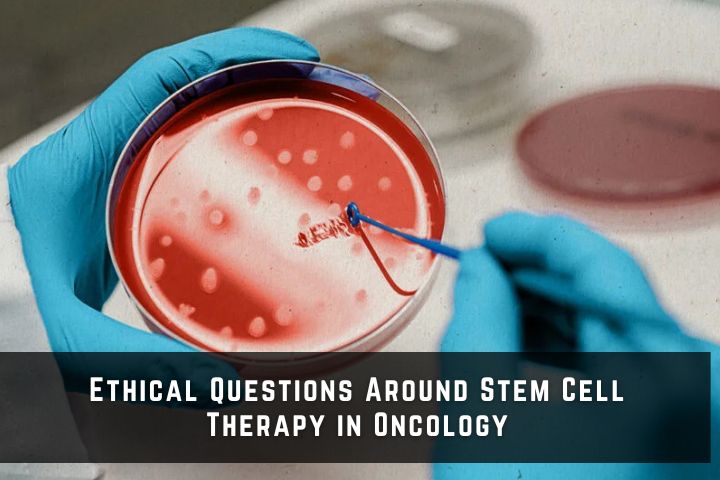Ethical Questions Around Stem Cell Therapy in Oncology
Stem cell therapy has emerged as one of the most promising frontiers in cancer treatment. By harnessing the body’s natural ability to regenerate and repair, scientists are exploring how stem cells can target tumors, restore healthy tissue, and improve the effectiveness of existing therapies. From bone marrow transplants to experimental regenerative approaches, stem cell-based treatments are offering new hope to patients across the world.
However, this hope comes with a range of ethical questions and dilemmas. As research progresses, it becomes increasingly important to balance innovation with integrity — ensuring that life-saving treatments remain both safe and morally responsible.
1. Understanding Stem Cell Therapy in Cancer Treatment
In oncology, stem cell therapy primarily involves the use of hematopoietic stem cells (HSCs) — cells that can form all types of blood cells. These are commonly used in bone marrow transplants to restore healthy blood production after intensive chemotherapy or radiation therapy. This technique has been a cornerstone of treatment for leukemia, lymphoma, and multiple myeloma.
Beyond this, researchers are exploring mesenchymal stem cells (MSCs) for their potential to repair damaged tissues and deliver anti-cancer agents directly to tumors. They can act as “biological vehicles,” carrying therapeutic molecules or immune-modulating agents to cancer sites.
While these breakthroughs hold tremendous promise, the rapid advancement of stem cell applications has sparked debate — particularly around how the cells are sourced, used, and tested in human patients.
2. Ethical Dilemmas: Consent, Source, and Safety
The most debated ethical issue surrounding stem cell therapy is the source of the stem cells. Embryonic stem cells (ESCs), derived from early-stage embryos, raise moral concerns because their extraction involves the destruction of the embryo. This has led to questions about whether the potential to save lives justifies the means of obtaining these cells.
In contrast, adult stem cells and induced pluripotent stem cells (iPSCs) — adult cells reprogrammed to act like embryonic ones — offer ethically safer alternatives. However, challenges around their safety, genetic stability, and effectiveness still remain.
Another major concern is informed consent. Patients undergoing experimental stem cell treatments must be fully aware of the risks, uncertainties, and lack of long-term data. Unfortunately, in many cases around the world, unregulated clinics have offered “miracle cures” without proper scientific validation, exploiting vulnerable patients.
There are also questions about equity and accessibility — who gets access to these advanced therapies, and at what cost? The high expense of stem cell treatments often makes them available only to those who can afford them, raising issues of fairness in global healthcare.
3. Striking a Balance: Regulation, Responsibility, and Hope
The future of stem cell therapy in oncology depends not only on scientific progress but also on ethical governance. Strict clinical regulations, transparent research practices, and robust ethical oversight are essential to ensure that innovation serves humanity responsibly.
Global organizations like the World Health Organization (WHO) and International Society for Stem Cell Research (ISSCR) emphasize the need for ethical frameworks guiding the sourcing, testing, and use of stem cells. This includes ensuring patient consent, maintaining scientific integrity, and preventing commercialization of unapproved therapies.
Another key focus is on responsible communication. Researchers and clinicians must avoid overpromising results and instead provide realistic expectations about what stem cell therapy can achieve today. The line between hope and hype is thin — and preserving public trust depends on transparency and accountability.
Ultimately, the ethical path forward involves balancing innovation with compassion — advancing lifesaving treatments while upholding respect for human life, dignity, and fairness.
Ethical Cancer Care at Dr. A.V. Cancer Institute
At Dr. A.V. Cancer Institute, we believe that cutting-edge science and ethical integrity must go hand in hand. Our expert oncologists and researchers are deeply committed to providing safe, evidence-based cancer treatments that align with international medical and ethical standards.
Through our advanced research programs, compassionate patient care, and strict adherence to ethical practices, we ensure that every patient receives treatment that is both innovative and responsible.
With world-class expertise and a patient-first philosophy, Dr. A.V. Cancer Institute provides the best services in advanced oncology and stem cell-based therapies, bringing science, compassion, and ethics together for a healthier future.
At Dr. A.V. Cancer Institute — innovation saves lives, and ethics safeguards trust.

